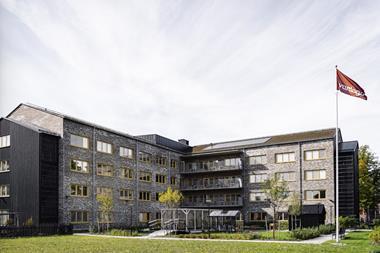Real estate deal activity has plummeted faster in Sweden than in other major European markets, with the country’s overleveraged listed property firms rapidly losing equity value as they struggle to sell assets.
But Tom Leahy, head of EMEA research at MSCI, said the underlying Swedish real estate market is robust and that if it remained so, buyers could come back.
Over the past 12 months, investment activity in Swedish commercial property has collapsed as the market has fought to adapt to higher interest rates, with the sharp rise in lending rates also putting pressure on the borrowers that used debt to power a wave of industry consolidation, Leahy wrote in a blog published this week.
So far in 2023, Swedish-listed property companies have sold $3.1bn (€2.9bn) of European assets as they try to deleverage, according to the MSCI analyst.
Swedish REITs have high levels of exposure to floating-rate, short-duration bonds, many of which were issued in 2020 and 2021 when their benchmark rate was close to zero – but by the end of April it had risen to 3.49%, according to MSCI.
“This has caused significant challenges for the issuers of the debt, much of which was short-term,” Leahy said, adding that Refinitiv data show that around 45% of the bonds are due to mature by the end of 2025.
Share prices of the listed property companies have plunged as they struggle with higher interest costs and loan-to-value ratios, with Castellum falling by 59% between January and mid-May, Corem losing 79% and SBB plummeting by 91% – all in a period when the MSCI Sweden Index fell by 14%.
“Some of the issues facing these listed players, which own around one-third of all Swedish investment properties by count, are reflected in the direct market, where the slowdown in dealmaking has eclipsed that of the 2008 global financial crisis,” Leahy said.
In the 12 months to March, only SEK138bn (€11.8bn) was spent on Swedish commercial property, less than half the volume of the prior 12 months. In the first quarter 2023, SEK13.3bn was spent, making it the weakest period for dealmaking since Q4 2009, according to MSCI.
However, Leahy told IPE Real Assets it was important to remember that this was mainly a capital markets issue. “The underlying property market is correcting because of higher interest rates, but not to the same extent as implied by the shifts in REIT pricing,” he said.
“It’s really an issue to do with the leverage and their indebtedness and the way they’ve structured their debt,” Leahy added, pointing to the fact that rental growth in Sweden actually accelerated last year.
“The volatility in inflation and interest rates give people pause for thought, but if you see some stability in the rate regime and the underlying performance of the real estate market remains robust then it should pull people back into the market,” he said.
Global private equity investors like Blackstone and Brookfield had stepped into a space vacated by domestic players, at a time of relative health in the occupier market, Leahy said.
“Some of these private-equity investors are able to come into the market at a time of uncertainty, providing liquidity and helping to re-set pricing,” he said.
SBB, whose founder and CEO Ilija Batljan stepped down last week, today had its credit rating downgraded again by Standard & Poor’s, according to Bloomberg.
To read the latest edition of the latest IPE Real Assets magazine click here.


















